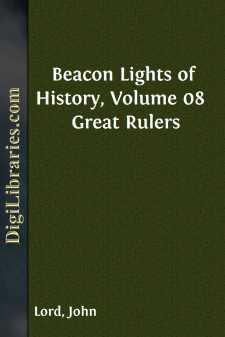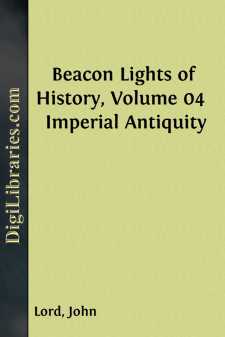Categories
- Antiques & Collectibles 13
- Architecture 36
- Art 48
- Bibles 22
- Biography & Autobiography 813
- Body, Mind & Spirit 142
- Business & Economics 28
- Children's Books 15
- Children's Fiction 12
- Computers 4
- Cooking 94
- Crafts & Hobbies 4
- Drama 346
- Education 46
- Family & Relationships 57
- Fiction 11828
- Games 19
- Gardening 17
- Health & Fitness 34
- History 1377
- House & Home 1
- Humor 147
- Juvenile Fiction 1873
- Juvenile Nonfiction 202
- Language Arts & Disciplines 88
- Law 16
- Literary Collections 686
- Literary Criticism 179
- Mathematics 13
- Medical 41
- Music 40
- Nature 179
- Non-Classifiable 1768
- Performing Arts 7
- Periodicals 1453
- Philosophy 64
- Photography 2
- Poetry 896
- Political Science 203
- Psychology 42
- Reference 154
- Religion 513
- Science 126
- Self-Help 84
- Social Science 81
- Sports & Recreation 34
- Study Aids 3
- Technology & Engineering 59
- Transportation 23
- Travel 463
- True Crime 29
Beacon Lights of History, Volume 08 Great Rulers
by: John Lord
Description:
Excerpt
CARDINAL DE RICHELIEU.
A. D. 1585-1642.
ABSOLUTISM.
Cardinal de Richelieu is an illustration of what can be done for the prosperity and elevation of a country by a man whom we personally abhor, and whose character is stained by glaring defects and vices. If there was a statesman in French history who was pre-eminently unscrupulous, selfish, tyrannical, and cruel, that statesman was the able and wily priest who ruled France during the latter years of Louis XIII. And yet it would be difficult to find a ruler who has rendered more signal services to the state or to the monarch whom he served. He extricated France from the perils of anarchy, and laid the foundation for the grandeur of the monarchy under Louis XIV. It was his mission to create a strong government, when only a strong government could save the kingdom from disintegration; so that absolutism, much as we detest it, seems to have been one of the needed forces of the seventeenth century. It was needed in France, to restrain the rapacity and curtail the overgrown power of feudal nobles, whose cabals and treasons were fatal to the interests of law and order.
The assassination of Henry IV. was a great calamity. The government fell into the hands of his widow, Marie de Médicis, a weak and frivolous woman. Under her regency all kinds of evils accumulated. So many conflicting interests and animosities existed that there was little short of anarchy. There were not popular insurrections and rebellions, for the people were ignorant, and were in bondage to their feudal masters; but the kingdom was rent by the rivalries and intrigues of the great nobles, who, no longer living in their isolated castles but in the precincts of the court, fought duels in the streets, plundered the royal treasury, robbed jewellers and coachmakers, paid no debts, and treated the people as if they were dogs or cattle. They claimed all the great offices of state, and all high commands in the army and navy; sold justice, tampered with the law, quarrelled with the parliaments,--indeed, were a turbulent, haughty, and powerful aristocracy, who felt that they were above all law and all restraint. They were not only engaged in perpetual intrigues, but even in treasonable correspondence with the enemies of their country. They disregarded the honor of the kingdom, and attempted to divide it into principalities for their children. "The Guises wished to establish themselves in Provence, the Montmorencies in Languedoc, the Longuevilles in Picardy. The Duke of Epernon sought to retain the sovereignty of Guienne, and the Duke of Vendôme to secure the sovereignty of Brittany." One wanted to be constable, another admiral, a third to be governor of a province, in order to tyrannize and enrich themselves like Roman proconsuls. Every outrage was shamelessly perpetrated by them with impunity, because they were too powerful to be punished. They assassinated their enemies, filled the cities with their armed retainers, and made war even on the government; so that all central power was a mockery. The Queen-regent was humiliated and made contemptible, and was forced, in her turn and in self-defence, to intrigues and cabals, and sought protection by setting the nobles up against each other, and thus dividing their forces. Even the parliaments, which were courts of law, were full of antiquated prejudices, and sought only to secure their own privileges,--at one time siding with the Queen-regent, and then with the factious nobles. The Huguenots were the best people of the land; but they were troublesome, since they possessed cities and fortresses, and erected an imperium in imperio. In their synods and assemblies they usurped the attributes of secular rulers, and discussed questions of peace and war. They entered into formidable conspiracies, and fomented the troubles and embarrassments of the government The abjuration of Henry IV. had thinned their ranks and deprived them of court influence. No great leaders remained, since they had been seduced by fashion. The Huguenots were a disappointed and embittered party, hard to please, and hard to be governed; full of fierce resentments, and soured by old recollections. They had obtained religious liberty, but with this they were not contented. Their spirit was not unlike that of the Jacobins in England after the Stuarts were expelled from the throne. So all things combined to produce a state of anarchy and discontent. Feudalism had done its work. It was a good thing on the dissolution of the Roman Empire, when society was resolved into its original elements,--when barbarism on the one hand, and superstition on the other, made the Middle Ages funereal, dismal, violent, despairing. But commerce, arts, and literature had introduced a new era,--still unformed, a vast chaos of conflicting forces, and yet redeemed by reviving intelligence and restless daring. The one thing which society needed in that transition period was a strong government in the hands of kings, to restore law and develop national resources.
Now amid all these evils Richelieu grew up. Under the guise of levity and pleasure and good-nature, he studied and comprehended all these parties and factions, and hated them all. All alike were hostile to the central power, which he saw was necessary to the preservation of law and to the development of the resources of the country.
Moreover, he was ambitious of power himself, which he loved as Michael Angelo loved art, and Palestrina loved music. Power was his master-passion, and consumed all other passions; and he resolved to gain it in any way he could,--unscrupulously, by flatteries, by duplicities, by sycophancies, by tricks, by lies, even by services. That was his end. He cared nothing for means. He was a politician.
The progress of his elevation is interesting, but hideous. Armand Jean Duplessis was born in 1585, of a noble family of high rank. He was designed for the army, but a bishopric falling to the gift of his family, he was made a priest. He early distinguished himself in his studies, for he was precocious and had great abilities. At twenty he was doctor of the Sorbonne, and before he was twenty-one he received from the Pope, Paul V., the emblems of spiritual power as a prelate of the Church. But he was too young to be made a bishop, according to the canons,--a difficulty, however, which he easily surmounted: he told a lie to the Pope, and then begged for an absolution. He then attached himself to the worthless favorite of the Queen-regent, Concini, one of her countrymen; and through him to the Queen herself, Marie de Medicis, who told him her secrets, which he betrayed when it suited his interests. When Louis XIII. attained his majority, Richelieu paid his court to De Luynes, who was then all-powerful with the King, and who secured him a cardinal's hat; and when this miserable favorite died,--this falconer, this keeper of birds, yet duke, peer, governor, and minister,--Richelieu wound himself around the King, Louis XIII., the most impotent of all the Bourbons, made himself necessary, and became minister of foreign affairs; and his great rule began (1624).
During all these seventeen years of office-climbing, Richelieu was to all appearance the most amiable man in France; everybody liked him, and everybody trusted him. He was full of amenities, promises, bows, smiles, and flatteries. He always advocated the popular side with reigning favorites; courted all the great ladies; was seen in all the fashionable salons; had no offensive opinions; was polite to everybody; was non-committal; fond of games and spectacles; frivolous among fools, learned among scholars; grave among functionaries, devout among prelates; cunning as a fox, brave as a lion, supple as a dog; all things to all men; an Alcibiades, a Jesuit; with no apparent animosities; handsome, witty, brilliant; preacher, courtier, student; as full of hypocrisy as an egg is of meat; with eyes wide open, and thoughts disguised; all eyes and no heart; reserved or communicative as it suited his purpose. This was that arch-intriguer who was seeking all the while, not the sceptre of the King, but the power of the King. Should you say that this non-committal, agreeable, and amiable politician--who quarrelled with nobody, and revealed nothing to anybody; who had cheated all parties by turns--was the man to save France, to extricate his country from all the evils to which I have alluded, to build up a great throne (even while he who sat upon it was utterly contemptible) and make that throne the first in Europe, and to establish absolutism as one of the needed forces of the seventeenth century?
Yet so it was; and his work was all the more difficult when the character of the King is considered. Louis XIII. was a different kind of man from his father Henry IV. and his grandson Louis XIV. He had no striking characteristics but feebleness and timidity and love of ignoble pleasures. He had no ambitions or powerful passions; was feeble and sickly from a child,--ruled at one time by his mother, and then by a falconer; and apparently taking but little interest in affairs of state.
But if it was difficult to gain ascendency over such a frivolous and inglorious Sardanapalus, it was easy to retain it when this ascendency was once acquired. For Richelieu made him comprehend the dangers which menaced his life and his throne; that some very able man must be intrusted with supreme delegated power, who would rule for the benefit of him he served,--a servant, and yet a master; like Metternich in Austria, after the wars of Napoleon,--a man whose business and aim were to exalt absolutism on a throne. Moreover, he so complicated public affairs that his services were indispensable. Nobody could fill his place.
Also, it must be remembered that the King was isolated, and without counsellors whom he could trust. After the death of De Luynes he had no bosom friend. He was surrounded with perplexities and secret enemies. His mother, who had been regent, defied his authority; his brothers sought to wear his crown; the nobles conspired against his throne; the Protestants threatened another civil war; the parliaments thought only of retaining their privileges; the finances were disordered; the treasures which Henry IV. had accumulated had been squandered in bribing the great nobles; foreign enemies had invaded the soil of France; evils and dangers were accumulating on every side, with such terrific force as to jeopardize the very existence of the monarchy; and one necessity became apparent, even to the weak mind of the King,--that he must delegate his power to some able man, who, though he might rule unscrupulously and tyrannically, would yet be faithful to the crown, and establish the central power for the benefit of his heirs and the welfare of the state.
Now Richelieu was just the man he needed, just such a man as the times required,--a man raised up to do important work, like Cromwell in England, like Bismarck in Prussia, like Cavour in Italy: doubtless a great hypocrite, yet sincere in the conviction that a strong government was the great necessity of his country; a great scoundrel, yet a patriotic and wise statesman, who loved his country with the ardor of a Mirabeau, while nobody loved him. Besides, he loved absolutism, both because he was by nature a tyrant, and because he was a member of the Roman Catholic hierarchy. He called to mind old Rome under the Caesars, and mediaeval Rome under the popes, and what a central authority had effected for civilization in times of anarchy, and in times of darkness and superstition; and the King to him was a sort of vicegerent of divine power, clothed in authority based on divine right,--the idea of kings in the Middle Ages. The state was his, to be managed as a man manages his farm,--as a South Carolinian once managed his slaves. The idea that political power properly emanates from the people,--the idea of Rousseau and Jefferson,--never once occurred to him; nor even political power in the hands of aristocrats, fettered by a constitution and amenable to the nation. A constitutional monarchy existed nowhere, except perhaps in England. Unrestricted and absolute power in the hands of a king was the only government he believed in. The king might be feeble, in which case he could delegate his power to ministers; or he might be imbecile, in which case he might be virtually dethroned; but his royal rights were sacred, his authority incontestable, and consecrated by all usage and precedent.
Yet while Richelieu would uphold the authority of the crown as supreme and absolute, he would not destroy the prestige of the aristocracy; for he was a nobleman himself,--he belonged to their class. He believed in caste, in privileges, in monopolies; therefore he would not annul either rank or honor. The nobles were welcome to retain their stars and orders and ribbons and heraldic distinctions, even their parks and palaces and falcons and hounds. They were a favored class, that feudalism had introduced and ages had indorsed; but even they must be subservient to the crown, from which their honors emanated, and hence to order and law, of which the king was the keeper. They must be subjects of the government, as well as allies and supporters. The government was royal, not aristocratic. The privileges of the nobility were social rather than political, although the great offices of state were intrusted to them as a favor, not as a right,--as simply servants of a royal master, whose interests they were required to defend. Some of them were allied by blood with the sovereign, and received marks of his special favor; but their authority was derived from him.
Richelieu was not unpatriotic. He wished to see France powerful, united, and prosperous; but powerful as a monarchy, united under a king, and prosperous for the benefit of the privileged orders,--not for the plebeian people, who toiled for supercilious masters. The people were of no account politically; were as unimportant as slaves,--to be protected in life and property, that they might thrive for the benefit of those who ruled them.
So when Richelieu became prime minister, and felt secure in his seat,--knowing how necessary to the King his services were,--he laid aside his amiable manners as a politician, and determined as a statesman to carry out remorselessly and rigidly his plans for the exaltation of the monarchy. And the moment he spoke at the council-board his genius predominated; all saw that a great power had arisen, that he was a master, and would be obeyed, and would execute his plans with no sentimentalities, but coldly, fixedly, like a man of blood and iron, indifferent to all obstacles. He was a man who could rule, and therefore, on Carlyle's theory, a man who ought to rule, because he was strong.
There is something imposing, I grant, in this executive strength; it does not make a man interesting, but it makes him feared. Every ruler,--in fact every man intrusted with executive power, especially in stormy times,--should be resolute, unflinching, with a will dominating over everything, with courage, pluck, backbone, be he king or prime minister, or the superintendent of a railway, or director of a lunatic asylum, or president of a college. No matter whether the sphere be large or small, the administration of power requires energy, will, promptness of action, without favor and without fear. And if such a person rules well he will be respected; but if he rules unwisely,--if capricious, unjust, cruel, vindictive,--he may be borne for a while, until patience is exhausted and indignation becomes terrible: a passion of vengeance, like that which overthrew Strafford. Wise tyrants, like Peter and Frederic the Great, will be endured, from their devotion to public interests; but unwise tyrants, ruling for self-interest or pleasure, will be hurled from power, or assassinated like Nero or Commodus, as the only way to get rid of the miseries they inflict.
Now of the class of wise and enlightened tyrants was Richelieu. His greatness was in his will, sagacity, watchfulness, and devotion to public affairs. Factions could not oust him, because he was strong; the King would not part with him, because he was faithful; posterity will not curse him, because he laid the foundation of the political greatness of his country.
I do not praise his system of government. On abstract principles I feel that it is against the liberties of mankind; nor is it in accordance with the progress of government in our modern times. All the successive changes which reforms and revolutions have wrought have been towards representative and constitutional governments,--as in England and France in the nineteenth century. Absolutism or Caesarism is only adapted to people in primitive or anarchical states of society,--as in old Rome, or Rome under the popes. It is at the best a necessary tyranny, made so by the disorders and evils of life. It can be commended only when men are worse than governments; when they are to be coerced like wild beasts, or lunatics, or scoundrels. When there is universal plunder, lying, cheating, and murdering; when laws are a mockery, and when demagogues reign; when all public interests are scandalously sacrificed for private emolument,--then absolutism may for a time be necessary; but only for a time, unless we assume that men can never govern themselves.
In that state of society into which France was plunged during the regency of Marie de Médicis, and at which I have glanced, absolutism was perhaps a needed force. Then Richelieu, its great modern representative, arose,--a model statesman in the eyes of Peter the Great.
But he was not to reign, and trample all other powers beneath his feet, without a memorable struggle. Three great forces were arrayed against him. These were the Huguenots, the nobles, and the parliaments,--the Protestant, the feudal, and the legal elements of society in France. The people,--at least the peasantry,--did not rise up against him; they were powerless and too unenlightened. The priests sustained him, and the common people acquiesced in his rigid rule, for he established law and order.
He began his labors in behalf of absolutism by suppressing the Huguenots. That was the only political party which was urgent for its rights. They were an intelligent party of tradesmen and small farmers; they were plebeian, but conscientious and aspiring. They were not contented alone to worship God according to the charter which Henry IV. had granted, but they sought political power; and they were so unfortunate as to be guilty of cabals and intrigues inconsistent with a central power. They were factious, and were not disposed to submit to legitimate authority. They had declined in numbers and influence; they had even degenerated in religious life; but they were still powerful and dangerous foes. They had retreated to their strong fortress of La Rochelle, resolved, if attacked, to fight once again the whole power of the monarchy. They put themselves in a false position; they wanted more than the Edict of Nantes had guaranteed.
Unfortunately for them they had no leaders worthy to marshal their forces. Fashion and the influence of the court had seduced their men of rank; nor had they the enthusiasm which had secured victory at Ivry. Nor could they contend openly in the field; they were obliged to intrench themselves in an impregnable fortress: there they deemed they could defy their enemy. They even invoked the aid of England, and thus introduced foreign enemies on the soil of France, which was high-treason. They put themselves in the attitude of rebels against the government; and so long as English ships, with supplies, could go in and out of their












